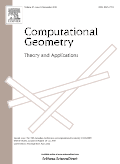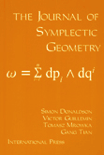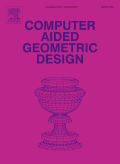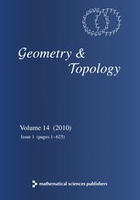
Journal of Computational Geometry
Scope & Guideline
Navigating the Dimensions of Computational Geometry
Introduction
Aims and Scopes
- Algorithm Development and Optimization:
The journal consistently focuses on the development of new algorithms for various geometric problems, emphasizing their efficiency and applicability to real-world scenarios. - Geometric Data Structures:
A significant area of research includes the design and analysis of geometric data structures, which are crucial for efficiently storing and manipulating geometric information. - Topological and Geometric Relations:
The studies often explore the relationships between geometric and topological concepts, providing insights into how these fields intersect and inform each other. - Applications in Computer Science and Related Fields:
The journal highlights the application of computational geometry in diverse areas such as computer graphics, robotics, geographic information systems (GIS), and data analysis. - Theoretical Advances:
The publication features theoretical advancements in computational geometry, including complexity analysis and lower bounds for various geometric problems.
Trending and Emerging
- Persistent Homology and Topological Data Analysis:
Recent papers indicate a growing interest in persistent homology and its applications to topological data analysis, showcasing the relevance of topology in understanding complex data structures. - Geometric Algorithms in Machine Learning and Data Science:
There is an increasing trend toward applying geometric algorithms in machine learning and data science, highlighting the importance of geometric insights in processing and analyzing large datasets. - GPU and Parallel Computing Techniques:
The utilization of GPU and parallel computing for geometric computations is on the rise, reflecting the need for faster and more efficient processing methods in computational geometry. - Dynamic and Adaptive Algorithms:
A significant trend is the development of dynamic algorithms that adapt to changes in data, which is crucial for real-time applications in various fields such as robotics and computer graphics. - Interdisciplinary Applications:
There is a notable increase in research exploring interdisciplinary applications of computational geometry, particularly in fields like biology, physics, and network analysis, indicating a broadening of the journal’s scope.
Declining or Waning
- Basic Geometric Constructions:
There is a noticeable decrease in publications focusing solely on fundamental geometric constructions, indicating a shift towards more complex and applied geometric problems. - Classical Geometric Problems:
Classical problems such as basic triangulation or convex hull algorithms seem to be receiving less attention, as researchers pursue more innovative and computationally intensive topics. - Static Geometric Algorithms:
Research that focuses on static algorithms, which do not consider dynamic changes in data, appears to be waning, likely due to the increased importance of dynamic algorithms in practical applications.
Similar Journals

Cambridge Journal of Mathematics
Empowering Researchers with Cutting-Edge InsightsCambridge Journal of Mathematics, published by INT PRESS BOSTON, INC, is a premier platform for the dissemination of cutting-edge research in the field of mathematics. With an ISSN of 2168-0930 and E-ISSN 2168-0949, this journal stands out in a competitive academic landscape, currently ranked #58 out of 399 in General Mathematics, placing it in the top 15% within its category according to Scopus metrics. The journal serves as a vital resource for researchers, professionals, and students alike, aiming to foster groundbreaking mathematical inquiries and foster collaboration across disciplines. Published from 2020 to 2024, the Cambridge Journal of Mathematics is committed to maintaining high standards of scholarship, making it an essential read for those who are passionate about advancing mathematical knowledge and its applications.

Journal of Dynamical Systems and Geometric Theories
Bridging Theory and Application in MathematicsJournal of Dynamical Systems and Geometric Theories, published by TARU Publications, is a prominent platform dedicated to advancing knowledge in the fields of dynamical systems and geometric theories. With an ISSN of 1726-037X and an E-ISSN of 2169-0057, this journal serves as a vital resource for researchers, professionals, and students who are keen on exploring the complexities of mathematical models and their applications in various scientific disciplines. Though currently listed as non-open access, the journal provides robust, peer-reviewed content that is essential for fostering innovative research and development. Situated in New Delhi, India, the Journal of Dynamical Systems and Geometric Theories is committed to disseminating high-quality scholarly articles that address both theoretical and practical issues related to dynamical systems, enhancing understanding and stimulating further academic discourse. To learn more about submission guidelines and access options, please visit the journal’s official webpage.

COMPUTATIONAL GEOMETRY-THEORY AND APPLICATIONS
Empowering Researchers with Cutting-edge Geometry InsightsCOMPUTATIONAL GEOMETRY - THEORY AND APPLICATIONS is a premier academic journal published by Elsevier, specializing in the interdisciplinary field of computational geometry. Since its inception in 1991, this journal has had a significant influence on the advancement of computational mathematics, offering a platform for innovative research that explores the theoretical and applied aspects of geometry and its applications in various scientific domains. With a 2023 impact factor placing it in the Q2 category for Computational Mathematics and Geometry and Topology, researchers can trust the rigor and relevance of the work published here. While the journal does not currently offer an open-access option, it remains highly influential, ranked in the mid-range percentile across multiple categories including Computational Theory and Mathematics and Control and Optimization. Therefore, it serves as an invaluable resource for researchers, professionals, and students passionate about pushing the boundaries of knowledge in computational geometry and its myriad applications. The ongoing publication commitments extend until 2025, further solidifying its role in shaping the future of this dynamic field.

Hacettepe Journal of Mathematics and Statistics
Exploring New Dimensions in Mathematical SciencesHacettepe Journal of Mathematics and Statistics, published by Hacettepe University in Turkey, is a vital platform for scholars in the fields of mathematics and statistics. With a commitment to promoting rigorous research, this journal covers a diverse range of topics including Algebra and Number Theory, Analysis, Geometry and Topology, and Statistics and Probability. Since its inception in 2008 and looking forward to its continued convergence up until 2024, it has established itself as a resource for both theoretical and applied mathematics. Although it currently holds a Q4 ranking in Algebra and Number Theory and Q3 in multiple other categories, its commitment to quality research is evident through its Scopus rankings, positioning it favorably among its peers. The journal operates on an open access model, facilitating wide dissemination of knowledge, and is particularly appealing to researchers, professionals, and students aiming to stay at the forefront of mathematical sciences. With an E-ISSN of 2651-477X, the Hacettepe Journal of Mathematics and Statistics aspires to foster collaboration and innovation in the mathematical community.

Journal of Symplectic Geometry
Advancing the frontiers of symplectic geometry.Journal of Symplectic Geometry, published by INT PRESS BOSTON, INC, is a premier outlet for research in the rapidly evolving fields of geometry and topology. With an ISSN of 1527-5256 and an E-ISSN of 1540-2347, this journal has established itself as a vital resource for scholars, featuring innovative research and comprehensive surveys that delve into the intricacies of symplectic geometry and its myriad applications. Boasting an impressive Q1 ranking in Geometry and Topology for 2023, the journal is dedicated to fostering a collaborative academic environment, attracting contributions from esteemed mathematicians worldwide. While the journal maintains a subscription-based model, it continues to prioritize disseminating high-quality research that propels advancements in the field. Researchers, professionals, and students alike will find the Journal of Symplectic Geometry indispensable for staying updated on the latest developments and contributing to ongoing discussions within the symplectic community, spanning from 2009 to 2024.

JOURNAL OF GEOMETRIC ANALYSIS
Advancing the Frontiers of Geometric InsightJOURNAL OF GEOMETRIC ANALYSIS, published by SPRINGER, stands as a premier platform for the dissemination of high-quality research in the field of geometric analysis. With its ISSN 1050-6926 and E-ISSN 1559-002X, this prestigious journal has maintained a robust academic reputation since its inception in 1991, boasting a convergence of ideas and research that will continue through 2024. It is categorized in the top quartile (Q1) of Geometry and Topology, highlighting its significance and influence in the mathematical community. Ranking 23rd out of 106 in its field, and placing in the 78th percentile according to Scopus metrics, this publication is essential for researchers, professionals, and students who seek to deepen their understanding of geometric structures and their applications. Though it operates under a subscription model rather than Open Access, the journal consistently aims to advance knowledge through rigorous peer-reviewed articles that explore the latest developments and methodologies in geometric analysis, making it a pivotal resource for anyone involved in mathematical research.

MEMOIRS OF THE AMERICAN MATHEMATICAL SOCIETY
Advancing Mathematical Knowledge, One Memoir at a Time.MEMOIRS OF THE AMERICAN MATHEMATICAL SOCIETY, published by the American Mathematical Society, stands as a pillar in the field of mathematics, showcasing rigorous research and comprehensive studies that significantly advance the discipline. With a distinguished history indexed under ISSN 0065-9266 and E-ISSN 1947-6221, this journal features work from leading mathematicians, primarily focusing on both applied and theoretical aspects of mathematics. Over the years, it has continuously ranked in the Q1 category for both Applied Mathematics and Miscellaneous Mathematics, reflecting its high impact within the academic community. The journal maintains its relevance and accessibility through stringent peer-review practices, aiming to foster innovative mathematical ideas and solutions from 1996 to 2006 and from 2009 onward, until 2024. With its impressive Scopus rankings and a strong percentile standing, MEMOIRS OF THE AMERICAN MATHEMATICAL SOCIETY is an essential resource for researchers, professionals, and students alike, dedicated to enriching and broadening the understanding of mathematical sciences.

COMPUTER AIDED GEOMETRIC DESIGN
Transforming Ideas into Geometric RealitiesCOMPUTER AIDED GEOMETRIC DESIGN is a premier journal dedicated to the interdisciplinary field of geometric design, showcasing cutting-edge research that intersects with Aerospace Engineering, Automotive Engineering, and Computer Graphics. Published by ELSEVIER in the Netherlands, this esteemed journal has maintained its relevance and impact since its inception in 1984, with a converged publication strategy continuing through 2024. Currently categorized in Q2 across multiple domains, including Aerospace Engineering and Computer-Aided Design, it reflects a solid standing within the academic community. Researchers can access high-quality articles, contributing to the advancement of applied mathematics and simulation methodologies. Despite not being an open-access journal, it offers significant insights that support innovation in design processes, making it a vital resource for academics, professionals, and students aiming to deepen their understanding and explore new possibilities in geometric design and related fields.

GEOMETRY & TOPOLOGY
Illuminating the Connections Between Geometry and TopologyGeometry & Topology is a leading journal in the field of mathematics, focusing on the intricate relationships between geometric structures and topological spaces. Published by Geometry & Topology Publications in the United Kingdom, this prestigious journal boasts an impressive ranking, placing it in the Q1 quartile for Geometry and Topology as of 2023, with a notable Scopus rank of #13 out of 106, indicating its significant impact within the discipline (88th percentile). With publication years spanning from 1997 to 2024, the journal serves as a vital platform for disseminating high-quality research, fostering advances in both theoretical and applied aspects of the field. While it does not currently operate under an Open Access model, it nevertheless attracts the attention of a diverse audience, including researchers, academics, and students eager to explore innovative methodologies and findings in geometry and topology. The journal’s commitment to excellence makes it an essential resource for anyone passionate about mathematical research.

DIFFERENTIAL GEOMETRY AND ITS APPLICATIONS
Unveiling Complex Geometrical FrameworksDIFFERENTIAL GEOMETRY AND ITS APPLICATIONS, published by Elsevier, is a premier academic journal primarily focused on the intricacies of differential geometry and its wide-ranging applications in various fields, including mathematics and theoretical physics. Established in 1991 and currently exploring relevant advancements through 2024, this journal serves as a vital platform for disseminating high-quality research that integrates theory and computational methodologies.With an ISSN of 0926-2245 and an E-ISSN of 1872-6984, it holds a significant position within the mathematical community, evidenced by its current quartile ranking of Q3 in major categories such as Analysis, Computational Theory and Mathematics, and Geometry and Topology. While open access options are not available, the journal's contributions are pivotal for researchers seeking to enrich their understanding of complex geometrical frameworks and their practical applications. As the landscape of differential geometry evolves, this journal stands out as a crucial resource for fostering innovation and collaboration among scholars and practitioners alike.